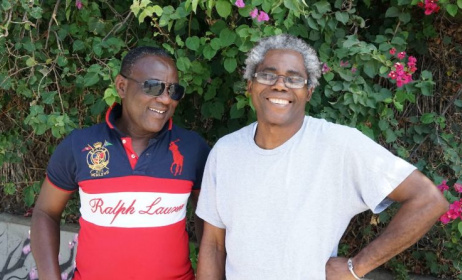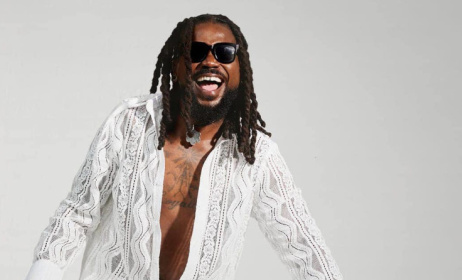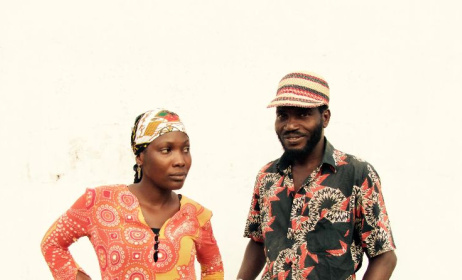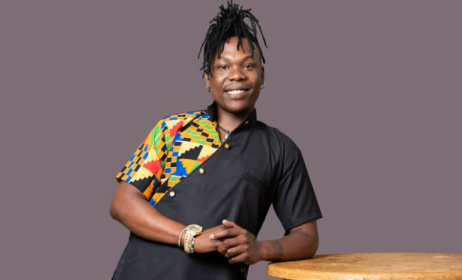Reggae in Ivory Coast
By Julien Le Gros
Ivory Coast has managed to build an undeniable and pioneering place in the African reggae scene, and even beyond Africa. But is there anything like an Ivorian reggae?
Désiré Aloka (aka Marceo Parker, in reference to the famous Maceo Parker) is convinced that there is. “What marks us apart is a way of playing, the colour,” says Aloka. “Alpha Blondy has his peculiar way, which makes his sound immediately recognizable. The same applies to Ismaël Isaac or Tiken. They have a special touch rooted in their African culture that differentiates them from the Jamaican,” he explains.
Venues and events
In 2003, Aloka created the Parker Place Abidjan, inspired by his London experience in 1992. “I lived in the black neighborhood called Seven Sisters. In the evenings, in the Subteranneaclub, I saw Maxi Priest, Chukki Starr, Junior Reid... I wanted to do the same in Abidjan,” he explained. He located his place in Zone 4 of the city, which has become a local institution of reggae culture.
The recently demolished Rasta Village Vridi[i] also organized many concerts. As the name suggests, this village promoted Rastafarianism through music – as well as through beautiful frescoes painted by Koko Shenko and other art. Other famous live bars have blossomed in the capital, offering various packages of reggae evenings: the Champion Blokosso on Ebrié lagoon, Kingston Place at Marcory, Pam’s on the Boulevard Latrille or the Café de Versailles at Angré.
With regard to festivals, the country has long suffered from poor management. “We don’t have the equivalent of Rototom in Spain or Garance in France,” decries Aloka. However, this trend seems to be changing. In 2012, the 24 Hours of Reggae Festival in Abidjan was launched. The second edition was held at Palais de la Culture in Abidjan in April 2014, with Rita Marley (Bob Marley’s widow) the event’s guest of honour.
The father: Alpha Blondy
Alpha Blondy (real name Seydou Koné) is unquestionably an emblematic figure of Ivorian reggae whose success is global. Influenced by Jamaica in his early days, his style has been described as recognising “a fascination with the guttural voice of Burning Spear which glorified Africa”. Blondy was able to promote an African identity in his singing, mainly in the Dioula dialect of northern Ivory Coast and Nouchi, a slang used in Abidjan. “Alpha Blondy has shown that reggae hails from us and can be sung in our African languages,” says reggae singer Kajeem. “Before, many Africans listened to reggae - more because of the rhythmic style than for the message. Blondy translated the reggae message in French and in our African languages.”
Since his album Jah Glory (Syllart) in 1983, Alpha Blondy initiated a movement that until then was non-existent in the country. Jacques Bizollon, founder of the legendary studio JBZ in Abidjan, who also shaped the beginnings of Ismaël Isaac and Tiken Jah Fakoly, remembers this historic recording session: “The producer Georges ‘Tai' Benson suggested I record a certain northern guy who sang reggae. For ‘Brigadier Sabari’ we sought the keyboard sound of a police car siren. We found that famous sound, which is always in our database! I remember when Alpha came to the studio, he sat on the steps of the staircase and asked me for a hundred CFA Francs to buy cigarettes. Now he has since hit a jackpot!”
The album sold millions of copies.“At Benson people lined up to pick up their CDs! I had a friend, Marcel Rapp, who owned a record store in Paris and worked at Pathé Marconi. He sold uncountable CDs!” says Bizollon.
Two years later, Alpha signed with EMI to produce an album with his orchestra, the Solar System, becoming the first star of African reggae internationally.
With the rise of piracy, however, this golden age seems to be now gone. But plenty of reggae talent remains. In 2011, together with its album Vision, Alpha released the CD collection Mogos du temple to encourage young Ivorian reggae talent performing at his Abidjan-based club, Café de Versailles. Among them were Ras Goody Brown, Kaloujah, Waipa Saberty, Mirak and the young Queen Sista Adjoba.
The successor: Tiken Jah Fakoly
Also from the northern region (precisely from the town of Odienne), Moussa Doumbia aka Tiken Jah Fakoly became known to the world in 1996 with the album Mangercratie, produced by Barclay, who for this occasion sent its audio engineers to the Ivorian capital. Tiken himself recalls: “I had produced an album three years earlier, but it passed completely unnoticed because of the death of President Houphouet-Boigny!’.
With his fiery, politically engaging lyrics - like the famous ‘Le Balayeur’ that deal with General Guei’s coup in 1999 -Tiken Jah Fakoly has become very popular with the French public. His melodies - sung in Malinke with traditional instruments such as Mandingo kora and ngoni-asserts him as the king of reggae, claiming the African roots of the genre. In this sense, Tiken inspired other African musicians like Ivorian Beta Simon (for example on the album Kraity Payan Guezin 2007), who sang in an invented language derived from other African languages (particularly Baissadé), as well as the Guinean artist Takana Zion.
A long-time rival of Alpha, the two reggae stars have had differences of opinion.Tiken finally sang a duet with him on the track ‘Reconciliation’off the album Mystic Power (Wagram, 2013). “Before we reconcile the Ivorian people we must take the lead in making peace among ourselves.” says Tiken. In 2012, following the Ivorian electoral crisis, the two men toured the country as part of the Caravan of Peace with other notable artists such as Meiway and Magic System. On Tiken’s latest album, Last Call (Barclay, 2014), we hear Alpha on the song ‘Diaspora’.Tiken Jah Fakoly releases a unifying call to the African diaspora to invest what they learned overseas in their homeland.
The dancehall generation
The next generation of Ivorian reggae is heavily influenced by hip-hop. Ivory Coast is one of the pioneers of the genre in the region, with the introduction of this kind of music by Yves Zogbo Junior on the Ivorian RTI as early as 1985. His programme launched artists such as Almighty and Ministry of Authenti and Stezo of the Imperial fleet.
Guillaume Konan, better known as Kajeem (a contraction of his name and surname in Baoule, the language of an ethnic group at the country’s interior) is one of the most active and talented artists of this new genre. In 1990, he abandoned his language studies to sing ragga with Ngowa Posse. “The Blondy generation is more pop-rock and roots reggae,” Kajeem explained. “I am part of a generation that was fed by hip-hop and a different kind of reggae, like Shabba Ranks, Yellowman, Tonton David and Daddy Yod.”
Kajeem, who hosts a Sunday reggae show on Nostalgie Abidjan, one of the most popular radios in the country, educates others by conducting writing workshops for young people and by defending causes he believes in. For example, he helped write the music for the 2004 film Child Soldier for the International Committee of the Red Cross, as well as a call for peace for the United Nations Operation in Côte d'Ivoire (UNOCI) titled ‘Tomorrow is Today’ in 2008.
Also from the Ivorian reggae scene, Kouakou Konan Hervé (alias Ras Goody Brown) comes from a group calledNegromuffin and is a member of the Rastafarian community Vridi. “In my music I have promoted our African languages by inserting them freely into my music. I toasted in Baoule to encourage the African youth to learn our languages. It all started here on this continent,” says Ras Goody Brown, who attests to the influence of JamaicansJacob Miller and Dennis Brown. “Africans and Jamaicans are brothers! We were just separated!”
Among this group of artists, one may also mention the roots-oriented style of Pablo U-Wa, who sings in the Bete language, for example on his album Sarajevo (Blue Silver, 1995). Naftaly, an ardent campaigner for the Rasta cause, is highly respected for his stance on social issues. In 2012, he released his self-produced album Soldiers of Jah. Another strong voice in the genre is Alain Spyrow and his group the Jahmo Band, which he formed in the wake of his 2008 album Jahmo Jahmo (meaning ‘Thank God’ in Baoule). In 2012, he won the prestigious international RFI Discovery Award. Together these and other artists continue to represent the proud tradition of reggae in Ivory Coast.
Note: All quotes are taken from interviews conducted in Abidjan in 2012 by Julien Le Gros, except that by Tiken Jah Fakoly and Alpha Blondy in Paris in 2013.
Further information:- Documentaries on reggae in Ivory Coast:
- http://www.youtube.com/watch?v=kTo-7FyDVAU(link is external)
- http://www.youtube.com/watch?v=gDScecaeREw(link is external)
- Reggae website, hosted from Abidjan: http://www.abidjanreggae.2007.fr/(link is external)
- Clips by Ras Goody Brown, Naftaly, Alain Spyrow, Isaac and the Keita brothers, Tiken Jah Fakoly, Alpha Blondy, Kajeem:
- http://www.youtube.com/watch?v=c4Jm_QBuglU(link is external)
- http://www.youtube.com/watch?v=eCL1WFRaKeU(link is external)
- http://www.youtube.com/watch?v=QDdgirra2vo(link is external)
- http://www.youtube.com/watch?v=HihUcnsREPg(link is external)
- https://www.youtube.com/watch?v=iZk0QQ8YCnA(link is external)
- https://www.youtube.com/watch?v=iigPkQQzO-0&index=8&list=PL9A4B1D91E76B920D(link is external)
- https://www.youtube.com/watch?v=qwjQOtGJ5Kc(link is external)
- https://www.youtube.com/watch?v=F4HmJVDuRNc(link is external)
[i] Founded by Ras Niemjah in 1998 and now destroyed for unknown reasons at the request of land stakeholders.




































Comments
Log in or register to post comments